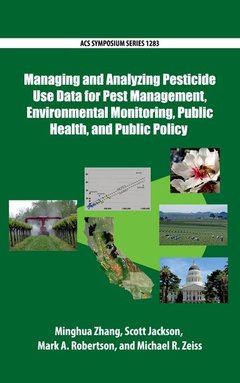Description
Managing and Analyzing Pesticide Use Data for Pest Management, Environmental Monitoring, Public Health, and Public Policy
ACS Symposium Series
Coordinators: Zhang Minghua, Jackson Scott, Robertson Mark A., Zeiss Michael R.
Language: English
Subject for Managing and Analyzing Pesticide Use Data for Pest...:
Publication date: 05-2019
576 p. · 16x23.6 cm · Hardback
576 p. · 16x23.6 cm · Hardback
Description
/li>Biography
/li>
The purpose of this book is to share with a wider public the fascinating insights derived from pesticide use data. The book also provides an overview of the systems used to gather and manage these data. The ultimate goal is to inspire researchers and the public to utilize pesticide use data in diverse fields including pest management, environmental monitoring, public health, and public policy. Most pesticide use surveys are aggregated at a geographic scale larger than the county level (e.g., state). However, the quality of this type of use data can vary greatly. Further, detailed usage information based on market surveys is not available for every type of pesticide use, though it is generally available for most crop uses. First-order risk assessment typically assumes that any registered product would be used at the maximum labeled rate, and the maximum number of allowable times per season or year. Though intended to protect against worst-case scenarios, this approach might lead to an overestimation of real-world risks. This first-order assessment is helpful as a screen, but resources may be wasted evaluating the impact of a product in a region where it is used only rarely, if at all. To incorporate real-world use patterns into risk assessments, one approach is to use data on where a particular pesticide has been sold. All pesticide manufacturers have a basic idea of where their products are being sold, but these data are often imprecise because of distributor sales networks that buy in bulk and redistribute product. In order to understand the markets they work in, manufacturers have used companies that survey end-users, because their own sales networks cannot provide detailed information. In an effort to further the science of pesticide use, this book explains the systems used for managing pesticide use data, and presents a selection of the compelling questions that have been investigated using that data.
Dr. Minghua Zhang is a professor at University of California, Davis in the Department of Land, Air and Water Resources, and a research scientist at the California Department of Pesticide Regulation. Her main research interests include GIS applications and watershed modeling to address questions in pest management and environmental impacts of pesticide use, especially in water quality. Dr. Zhang has published over 160 peer-reviewed articles. For her career contributions to agricultural science, Dr. Zhang was honored as a Fellow of the American Society of Agronomy and Soil Science Society of America. Dr. Scott H. Jackson is a Senior Manager for Valent LLC in Dublin California. He has worked in Industry for more than 30 years in various technical capacities. In his role in the Stewardship group, he has focused on stewardship questions that involve exposure modeling, environmental fate, and analytical chemistry. Dr. Jackson is active member of the American Chemical Society and currently serves as the AGRO Division Chair. He has organized many ACS symposia on topics ranging from environmental fate and exposure to application technology. Scott acts as a reviewer for several journals and has authored/coauthored more than 30 refereed publications. Dr. Mark Robertson earned a PhD in Molecular Biology & Genetics from the University of Oregon, Institute of Molecular Biology and the Université Louis Pasteur, Strasbourg, France studying insect immunology and later received research appointments in insect vector biology and pest management from the USDA, Agricultural Research Service, Laramie WY, Colorado State University, Fort Collins, CO, and the University of California, Riverside, CA. Dr. Robertson has since been working for the Department of Pesticide Regulation for 13 years supervising the IPM Research and Alliance grant programs which develop and promote adoption of integrated pest management systems. Dr. Michael Zeiss has a Ph.D. in entomology and a lifelong interest in
© 2024 LAVOISIER S.A.S.

